-
REVIEW01-01-2017
Patient with stroke: hospital discharge planning, functionality and quality of life
Revista Brasileira de Enfermagem. 2017;70(2):415-423
Abstract
REVIEWPatient with stroke: hospital discharge planning, functionality and quality of life
Revista Brasileira de Enfermagem. 2017;70(2):415-423
DOI 10.1590/0034-7167-2016-0166
Views0See moreABSTRACT
Objective:
analyze the strategies of hospital discharge planning for these patients, increasing the knowledge related to hospitalhome transition, discharge planning processes and the main impact on the quality of life and functionality.
Method:
integrative literature review using the PICOD criteria, with database research.
Results:
19 articles were obtained, using several approaches and contexts. For quality of life, the factors related to the patient satisfaction with care and the psychoemotional aspects linked with functionality are the most significant.
Conclusion:
during the hospitalization period, a careful hospital discharge planning and comprehensive care to patients and caregivers – in particular the functional and psychoemotional aspects – tend to have an impact on the quality of life of patients.

-
RESEARCH01-01-2017
Nursing throughout war times: political propaganda and professional valorization (1942-1945)
Revista Brasileira de Enfermagem. 2017;70(2):407-414
Abstract
RESEARCHNursing throughout war times: political propaganda and professional valorization (1942-1945)
Revista Brasileira de Enfermagem. 2017;70(2):407-414
DOI 10.1590/0034-7167-2016-0440
Views0See moreABSTRACT
Objective:
to discuss the symbolic effects of the publication on written press of institutional rites related to the courses promoted by the Brazilian Federal District’s Schools of Nursing during the Second World War.
Method:
exploratory and documentary study, whose sources were treated by historical method.
Results:
one noticed, in the news reports analyzed, that the Brazilian Estado Novo has used nurses images to divulge within the society the woman’s acting altruistic model in service to the country, through the systematic diffusion by the press of her honorable acting during the war, what assured the amplification of the visibility and acknowledgment of the Nursing profession in that context.
Conclusion:
the diffusion by press of emergency nurses graduations magnified their apparition in public spaces, occasion on which the institutional rite was strategically used to transmit to the society the urgency of the new profession, in order to support the political causes in vigor in the country.
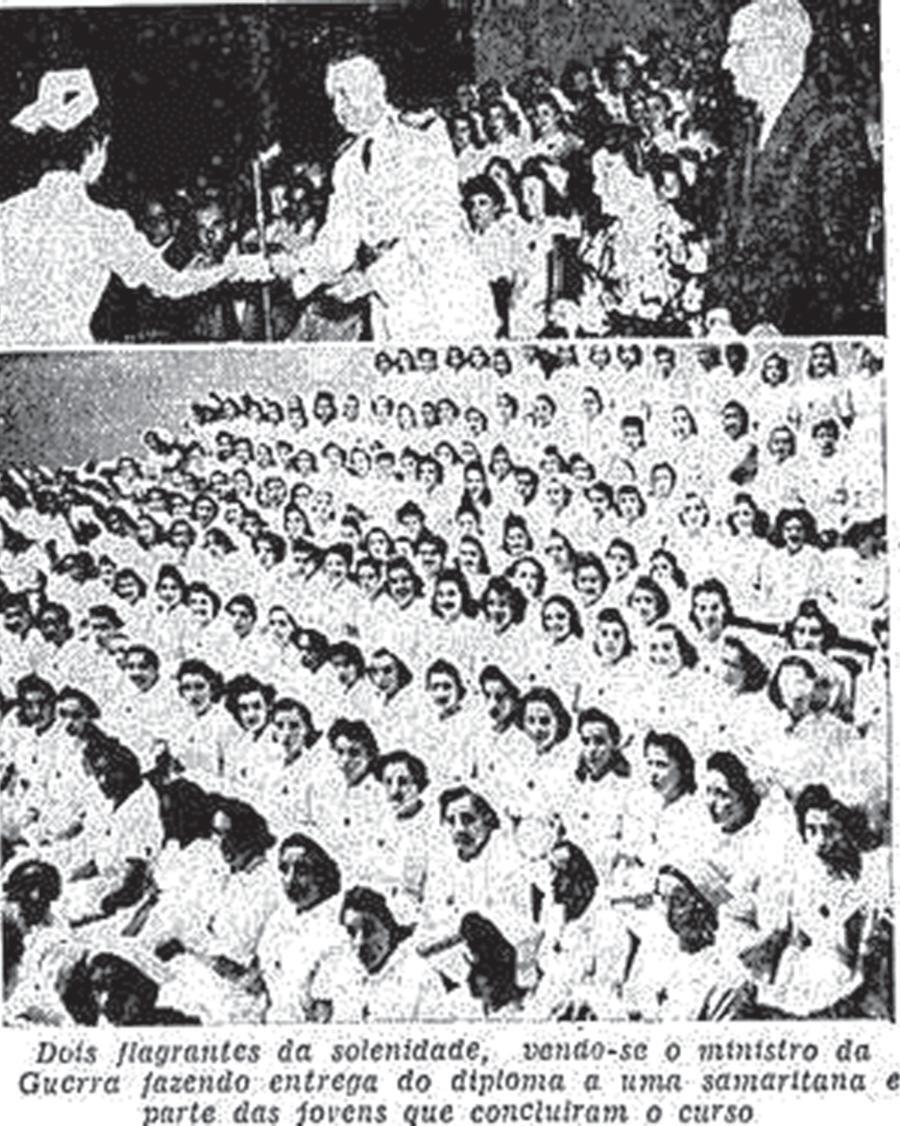
-
RESEARCH01-01-2017
Conformity of nurse prescribing to care needs: nurses’ understanding
Revista Brasileira de Enfermagem. 2017;70(2):400-406
Abstract
RESEARCHConformity of nurse prescribing to care needs: nurses’ understanding
Revista Brasileira de Enfermagem. 2017;70(2):400-406
DOI 10.1590/0034-7167-2016-0107
Views0See moreABSTRACT
Objective:
investigate the understanding of nurses on nurse prescribing conformity to the care needs of hospitalized patients and factors associated with that conformity.
Method:
a descriptive study, with a quantitative approach, was conducted at 20 in-patient units of a teaching hospital in the state of São Paulo. The participants (N=139) answered a semi-structured questionnaire.
Results:
For 43 (30.9%) nurses, nurse prescribing is always in line with patients’ care needs. The fields of body care and elimination, skin and mucosa care and investigation and monitoring were the most frequently addressed.
Conclusion:
in the perception of most nurses, nurse prescribing does not conform with patients’ health heeds. The establishment of strategies to improve prescribing quality is recommended, as well as the development of permanent qualification programs and the systematic use of instruments for assessment of patients’ care demands regarding nursing.
-
RESEARCH01-01-2017
Religious and spiritual coping in people living with HIV/Aids
Revista Brasileira de Enfermagem. 2017;70(2):392-399
Abstract
RESEARCHReligious and spiritual coping in people living with HIV/Aids
Revista Brasileira de Enfermagem. 2017;70(2):392-399
DOI 10.1590/0034-7167-2015-0170
Views0See moreABSTRACT
Objective:
evaluate the religiosity and the religious/spiritual coping of people living with HIV/Aids.
Method:
descriptive, cross-sectional study with quantitative approach, conducted in a reference HIV/Aids outpatient clinic in a university hospital of Recife-PE, Brazil, from June to November 2015. At total of 52 people living with HIV/Aids (PLWHA) participated in the research, which employed own questionnaire, the Duke University Religion Index (DUREL), and the Religious/Spiritual Coping Scale (RCOPE).
Results:
the sample presented high indices of organizational religiosity (4.23±1.66), non-organizational religiosity (4.63±1.50), and intrinsic religiosity (13.13±2.84). Positive RCOPE was used in high mean scores (3.66±0.88), and negative RCOPE had low use (2.12 ± 0.74). In total, use of RCOPE was high (3.77±0.74), having predominated the positive RCOPE (NegRCOPE/PosRCOPE ratio=0.65±0.46).
Conclusion:
it is evident the importance of encouraging religious activity and RCOPE strategies, seen in the past as inappropriate interventions in clinical practice.
-
RESEARCH01-01-2017
Satisfaction and dissatisfaction in the work of recyclable solid waste segregators: convergent-care research
Revista Brasileira de Enfermagem. 2017;70(2):384-391
Abstract
RESEARCHSatisfaction and dissatisfaction in the work of recyclable solid waste segregators: convergent-care research
Revista Brasileira de Enfermagem. 2017;70(2):384-391
DOI 10.1590/0034-7167-2016-0325
Views0See moreABSTRACT
Objectives:
describe elements that promote satisfaction and dissatisfaction in the work of recyclable solid waste segregators and conduct a nursing action focused on these elements.
Method:
qualitative research, convergent-care, conducted with members of the cooperative. Data production occurred during 2015 through participation observation, semi-structured interviews, and a convergence group. Analysis comprised the phases Apprehension, Synthesis, Theorization, and Transference.
Results:
four categories emerged. They showed satisfaction and dissatisfaction related to identification with tasks and work content, material and personal gains obtained from solid waste segregation, prejudice, lack of appreciation, and difficulties in interpersonal relationships. This last item, due to its importance, received a nursing action.
Conclusion:
the study contributed to the advancement of knowledge and the association of possibilities between the research performance and nursing care for workers.
-
RESEARCH01-01-2017
The game as strategy for approach to sexuality with adolescents: theoretical-methodological reflections
Revista Brasileira de Enfermagem. 2017;70(2):376-383
Abstract
RESEARCHThe game as strategy for approach to sexuality with adolescents: theoretical-methodological reflections
Revista Brasileira de Enfermagem. 2017;70(2):376-383
DOI 10.1590/0034-7167-2016-0043
Views0See moreABSTRACT
Objective:
To describe the Papo Reto [Straight Talk] game and reflect on its theoretical-methodological basis.
Method:
Analytical study on the process of elaboration of the Papo Reto online game, destined to adolescents aged 15-18 years, with access to the Game between 2014 and 2015.
Results:
the interactions of 60 adolescents from Belo Horizonte and São Paulo constituted examples of the potentialities of the Game to favor the approach to sexuality with adolescents through simulation of reality, invention and interaction. Based on those potentialities, four thinking categories were discussed: the game as pedagogic device; the game as simulation of realities; the game as device for inventive learning; and the game empowering the interaction.
Conclusion:
By permitting that the adolescents take risks on new ways, the Game allows them to become creative and active in the production of senses, in the creation of their discourses and in the ways of thinking, feeling and acting in the sexuality field.
-
RESEARCH01-01-2017
Tuberculosis among prison staff in Rio Grande do Sul
Revista Brasileira de Enfermagem. 2017;70(2):370-375
Abstract
RESEARCHTuberculosis among prison staff in Rio Grande do Sul
Revista Brasileira de Enfermagem. 2017;70(2):370-375
DOI 10.1590/0034-7167-2016-0012
Views0See moreABSTRACT
Objective:
to evaluate the risk of infection and illness caused by Mycobacterium tuberculosis among health care and security staff in prisons in two regions of Rio Grande do Sul (RS).
Method:
cross-sectional study involving prison staff. An interview and sputum smear microscopy and culture were performed. Latent infection was evaluated according to the result of the tuberculin test (TT), self-referred.
Results:
among staff who had a TT, 10 (83.3%) in the central region and 2 (16.7%) in the southern region were considered reactors. Length of employment among prison officers who reacted to TT was 15.3 years, and among health care workers, 4.1 years (p = 0.01). No cases of active tuberculosis (TB) were identified.
Conclusion:
prevalence of latent TB was 27.9%. Length of employment between different professional categories and their working regions was considered a risk factor for latent TB.
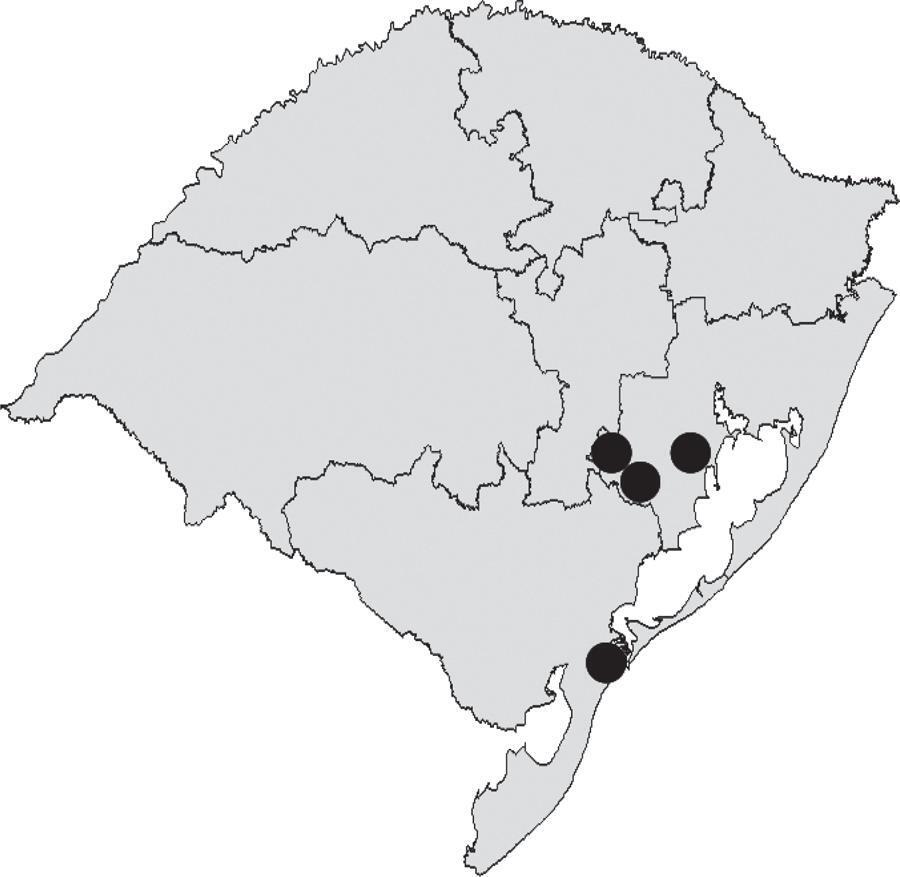
-
RESEARCH01-01-2017
Portable bathtub: technology for bed bath in bedridden patients
Revista Brasileira de Enfermagem. 2017;70(2):364-369
Abstract
RESEARCHPortable bathtub: technology for bed bath in bedridden patients
Revista Brasileira de Enfermagem. 2017;70(2):364-369
DOI 10.1590/0034-7167-2016-0178
Views0See moreABSTRACT
Objective:
determine the benefits of the Portable Bathtub as technology for bed bath in bedridden patients.
Method:
qualitative research of exploratory-descriptive character, whose data were collected by means of 30 interviews with patients, family members and professionals directly involved in bed bath, carried out with Portable Bathtub, in bedridden patients of a medical clinic, from July to December 2015.
Results:
from the data encoded by thematic content analysis resulted two categories: Portable Bathtub: from morphine to the patient’s rekindled eyes; From mechanized practice to unique, transforming care.
Conclusion:
we concluded that the Portable Bathtub constitutes enhancing technology, as it enables clinical improvement of the patient’s general condition and transcends traditional mechanized practices by the reach of advanced nursing care practices.
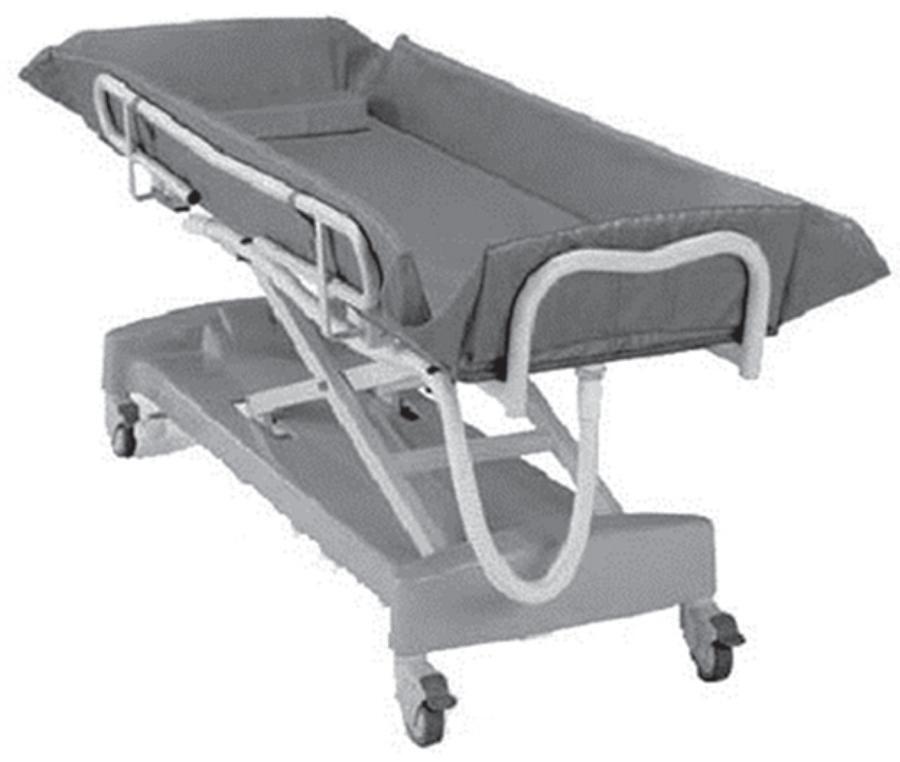
-
ORIGINAL ARTICLE12-16-2024
Narratives of sex workers: intimate partner violence and coping strategies
Revista Brasileira de Enfermagem. 2024;77(6):e20240180
Abstract
ORIGINAL ARTICLENarratives of sex workers: intimate partner violence and coping strategies
Revista Brasileira de Enfermagem. 2024;77(6):e20240180
DOI 10.1590/0034-7167-2024-0180
Views0See moreABSTRACT
Objectives:
to understand the narratives of sex workers about violence suffered by intimate partners and their coping strategies.
Methods:
qualitative research, focused on thematic oral history, carried out with six sex workers in southern Brazil, who responded to in-depth interviews using a flexible script. Thematic content analysis was used.
Results:
the study included cisgender women who self-identified as half black and half white. Most had children and were separated. They reported abusive relationships by their intimate partners, with emphasis on verbal, psychological, financial, and physical violence and attempted femicide. Such violence resulted in coping strategies, such as avoiding emotional bonds and maintaining a discreet life.
Final Considerations:
intimate partner violence is prevalent among participants, leading them to adopt strategies to preserve their safety and well-being, highlighting the need for public policies that meet their particularities and guarantee protection.
-
ORIGINAL ARTICLE12-16-2024
Software for the care of people with cardiovascular risk: construction and evidence of validity
Revista Brasileira de Enfermagem. 2024;77(6):e20240276
Abstract
ORIGINAL ARTICLESoftware for the care of people with cardiovascular risk: construction and evidence of validity
Revista Brasileira de Enfermagem. 2024;77(6):e20240276
DOI 10.1590/0034-7167-2024-0276
Views0See moreABSTRACT
Objectives:
to build and validate software for the care of people with cardiovascular risk.
Methods:
a methodological study, applied to software development, anchored in a nursing theory and classification system, in three stages: 1) requirements engineering; 2) software architecture and coding; and 3) testing and content validity by 12 experts in computer science, with a Content Validity Ratio score.
Results:
called e-TEORISC, in software format, for nursing care for people with cardiovascular risk, online and offline, containing a database linked to the Nursing Process stages. Experts considered that the attributes of functional suitability, performance efficiency, reliability, maintainability, usability, safety and portability obtained desirable scores.
Conclusions:
e-TEORISC has evidence of validity to instrumentalize care for people at cardiovascular risk, with potential for technology transfer to the Brazilian Health System.

-
ORIGINAL ARTICLE08-30-2024
Meanings attributed to changes experienced by individuals after COVID-19 hospitalization
Revista Brasileira de Enfermagem. 2024;77:e20230122
Abstract
ORIGINAL ARTICLEMeanings attributed to changes experienced by individuals after COVID-19 hospitalization
Revista Brasileira de Enfermagem. 2024;77:e20230122
DOI 10.1590/0034-7167-2023-0122
Views0See moreABSTRACT
Objectives:
to understand the meanings attributed to the experiences of individuals after hospitalization for COVID-19.
Methods:
qualitative study, with a theoretical framework based on Symbolic Interactionism and a methodological approach grounded in Grounded Theory. Nineteen participants who had moderate and severe forms of COVID-19 after hospitalization were interviewed. Data collection took place between April and November 2021 through online interviews, and the data were analyzed using initial and focused coding in the MAXQDA software.
Results:
the data illustrate new meanings attributed to different aspects of life after hospitalization, including relationships with others, the environment, physical and mental health, finances, identity, and interactions with a new social reality.
Conclusions:
the meanings are intrinsically linked to the value of interpersonal relationships, the perception of their impact, and the consequences after hospitalization. This allows professionals to understand the importance of this information to improve care and prepare for future epidemics.

-
ORIGINAL ARTICLE08-30-2024
Patient safety culture in times of the COVID-19 pandemic: a cross-sectional study in a hospital
Revista Brasileira de Enfermagem. 2024;77:e20230187
Abstract
ORIGINAL ARTICLEPatient safety culture in times of the COVID-19 pandemic: a cross-sectional study in a hospital
Revista Brasileira de Enfermagem. 2024;77:e20230187
DOI 10.1590/0034-7167-2023-0187
Views0See moreABSTRACT
Objectives:
to assess patient safety culture during the COVID-19 pandemic and identify the dimensions that need to be improved in hospital settings and which sector, open or closed, direct or indirect care, exhibits a higher level of safety culture.
Methods:
a descriptive and cross-sectional study. The validated version for Brazil of the Hospital Survey on Patient Safety Culture instrument was applied to assess patient safety culture. Those dimensions with 75% positive responses were considered strengthened.
Results:
all dimensions presented results lower than 75% of positive responses. Closed sectors showed a stronger safety culture compared to open ones. Indirect care sectors had a low general perception of patient safety when compared to direct care sectors.
Conclusions:
with the pandemic, points of weakness became even more evident, requiring attention and incisive interventions from the institution’s leaders.

-
REVIEW08-30-2024
Educational actions conducted during the pandemic with primary health care professionals: a scoping review
Revista Brasileira de Enfermagem. 2024;77:e20230352
Abstract
REVIEWEducational actions conducted during the pandemic with primary health care professionals: a scoping review
Revista Brasileira de Enfermagem. 2024;77:e20230352
DOI 10.1590/0034-7167-2023-0352
Views0See moreABSTRACT
Objectives:
to map the educational actions conducted with primary health care professionals during the COVID-19 pandemic.
Methods:
a scoping review conducted in August 2023, which covered databases such as CINAHL, Medline, LILACS, IBECS, BDENF, and Web of Science. In total, 32 publications were analyzed through content analysis.
Results:
the primary beneficiaries of the educational actions included 69% physicians, 56% nurses, 25% pharmacists, 13% social workers and dentists, 9% psychologists, community health agents, and laboratory professionals, and 6% nursing technicians, nutritionists, and physical educators. The predominant educational interventions were training sessions (mentioned in 19 publications), followed by Continuing Health Education (10 publications) and Continuing Education (three publications).
Final Considerations:
the educational interventions demonstrated positive impacts on professional practice, particularly the Continuing Health Education actions, which were notable for stimulating critical problem-solving among professionals.

-
REVIEW08-30-2024
Impact of financial toxicity on adults with cancer during the COVID-19 pandemic: an integrative review
Revista Brasileira de Enfermagem. 2024;77:e20240078
Abstract
REVIEWImpact of financial toxicity on adults with cancer during the COVID-19 pandemic: an integrative review
Revista Brasileira de Enfermagem. 2024;77:e20240078
DOI 10.1590/0034-7167-2024-0078
Views0See moreABSTRACT
Objectives:
to identify the repercussions of financial toxicity on the lives of adult cancer patients during the COVID-19 pandemic.
Methods:
an integrative review was conducted using the PubMed, Web of Science, Scopus, and Embase databases, as well as the Virtual Health Library portal, in March 2023.
Results:
out of 62 studies found, 13 were included for analysis. The primary repercussions of financial toxicity included difficulties in covering basic expenses such as food, housing, medication, transportation, and internet access; increased anxiety and concerns related to health and financial situations; reduction or absence of income; challenges in obtaining treatment or accessing healthcare services; rising expenses; and telemedicine as a less burdensome alternative.
Conclusions:
the pandemic has exacerbated financial toxicity; therefore, healthcare teams must recognize it as an adverse event of oncological treatment and understand its potential to affect various aspects of patients’ lives.

-
03-08-2024
Nursing as a player in tackling vaccine hesitancy and refusal
Revista Brasileira de Enfermagem. 2024;77:e77suppl101
Abstract
Nursing as a player in tackling vaccine hesitancy and refusal
Revista Brasileira de Enfermagem. 2024;77:e77suppl101
DOI 10.1590/0034-7167.202477suppl101
Views1Since the 1970s, the Brazilian Ministry of Health established the Brazilian National Immunization Program (PNI – Programa Nacional de Imunização), which preceded the Brazilian Health System and which was incorporated and strengthened due to the decentralized model to municipalities, but under single command at central level. Its objective was and still is to coordinate vaccination […]See more -
12-16-2024
Religión y experiencia profesional: ¿Serán predictores de la inteligencia espiritual de los enfermeros? Estudio transversal
Revista Brasileira de Enfermagem. 2024;77(6):e20240217
Abstract
Religión y experiencia profesional: ¿Serán predictores de la inteligencia espiritual de los enfermeros? Estudio transversal
Revista Brasileira de Enfermagem. 2024;77(6):e20240217
DOI 10.1590/0034-7167-2024-0217es
Views1See moreRESUMEN
Objetivos:
analizar la relación entre religión y experiencia profesional con la inteligencia espiritual en enfermeros.
Métodos:
estudio transversal y analítico realizado en 2021, participaron 544 profesionales de enfermería que laboraban en establecimiento de salud de Perú durante la pandemia por COVID-19. Para el análisis de los datos se emplearon el análisis de regresión múltiple y correlación de Pearson.
Resultados:
en los enfermeros predominó un nivel de inteligencia espiritual saludable (42,8%). Quienes no profesaban una religión tenían mayor probabilidad de tener menor puntaje de inteligencia espiritual (escala global y dimensiones); sin embargo, los enfermeros expertos tuvieron mayor probabilidad de tener mayor inteligencia espiritual (escala global y dimensiones) que los enfermeros novatos (p<0,05).
Conclusiones:
la inteligencia espiritual en los enfermeros fue predicha por la religión y la experiencia profesional. Este hallazgo sugiere que la inteligencia espiritual en enfermería se consolida mediante prácticas religiosas y durante el ejercicio profesional.
-
REVIEW07-17-2020
Approaches to workload in psychiatric and mental health nursing
Revista Brasileira de Enfermagem. 2020;73:e20190620
Abstract
REVIEWApproaches to workload in psychiatric and mental health nursing
Revista Brasileira de Enfermagem. 2020;73:e20190620
DOI 10.1590/0034-7167-2019-0620
Views0See moreABSTRACT
Objective:
to investigate approaches to workload in psychiatric and mental health nursing in Brazilian and international production of knowledge
Methods:
integrative literature review using six databases, covering January 2005 to March 2019. Articles in full in English, Spanish and Portuguese were included.
Results:
the sample consisted of 23 original articles classified as quantitative or emotional. The quantitative dimension was addressed in 12 articles and included: assessing patient care needs, identifying activities performed by the team, measuring time spent and developing and validating a measurement instrument. The emotional dimension included 11 articles the focus of which was on identifying stressors in the workplace, psychosocial risks and coping strategies.
Conclusion:
strategies were found for measuring workload and assessing the impact of stressors on nursing teams.
-
ORIGINAL ARTICLE08-30-2021
Historical aspects in pain management in palliative care in an oncological reference unit
Revista Brasileira de Enfermagem. 2021;74(5):e20200761
Abstract
ORIGINAL ARTICLEHistorical aspects in pain management in palliative care in an oncological reference unit
Revista Brasileira de Enfermagem. 2021;74(5):e20200761
DOI 10.1590/0034-7167-2020-0761
Views0See moreABSTRACT
Objective:
Describe the actions implemented for pain management in palliative care oncology and analyze the contribution of Hospital do Câncer IV, as a reference unit at the National Cancer Institute.
Methods:
Study of the history of the present time, whose sources were written documents and interviews with five participants. The collection took place from February to June 2018. The analysis of the written sources took place through internal and external criticism of the documents, considering their chronology and theme.
Results:
Professionals contributed with actions for pain management in palliative oncology care: in discussions and final drafting of ordinances, as rapporteurs at national and international events, in the elaboration of humanization conducts and systematization of assistance in addressing pain.
Final considerations:
These actions favored assistance in palliative oncology care at various levels of health care for patients and families, with greater technical and scientific recognition for all.
-
REVIEW04-16-2021
Nursing assistance in patient care with external ventricular drain: a scoping review
Revista Brasileira de Enfermagem. 2021;74(2):e20190796
Abstract
REVIEWNursing assistance in patient care with external ventricular drain: a scoping review
Revista Brasileira de Enfermagem. 2021;74(2):e20190796
DOI 10.1590/0034-7167-2019-0796
Views0See moreABSTRACT
Objectives:
to map the available evidence about nursing care aimed at adult patients using external ventricular drain.
Methods:
this is a review using the scoping review method.
Results:
Initially, 965 studies were identified and, after the eligibility criteria, a sample of 54 publications was obtained. Each of them was assessed according to GRADE, resulting in three studies with high quality; 14 with moderate quality; 32 with low quality; and five with very low quality. It was highlighted 20 nursing care subdivided into nine categories, namely: drainage system; bed positioning and mobilization; catheter care; monitoring of intracranial pressure; and medication administration.
Conclusions:
the scoping review made it possible to identify the main nursing care directed to adult patients undergoing placement of external ventricular drain from the evidence available to date.

-
REVIEW07-14-2021
Stress level experienced by participants in realistic simulation: a systematic review
Revista Brasileira de Enfermagem. 2021;74(4):e20201151
Abstract
REVIEWStress level experienced by participants in realistic simulation: a systematic review
Revista Brasileira de Enfermagem. 2021;74(4):e20201151
DOI 10.1590/0034-7167-2020-1151
Views0See moreABSTRACT
Objectives:
to identify the available evidence regarding stress levels experienced by participants in education based on a realistic simulation.
Methods:
systematic review that included randomized clinic trials on electronic databases: Cumulative Index to Nursing and Allied Health Literature, Cochrane Library, Latin-American and Caribbean Literature in Health Sciences, LIVIVO, PubMed, Scopus, and Web of Science. The additional search was performed on Google Scholar and OpenGrey. All searches occurred on September 24, 2020. The methodologic quality of the results was evaluated by the Cochrane Collaboration Risk of Bias Tool.
Results:
eighteen studies were included, which evaluated the participants’ stress using physiologic, self-reported measures, or the combination of both. Stress as experienced in a high level in simulated scenarios.
Conclusions:
evidence of the study included in this systematic review suggest that stress is experienced in a high level in simulated scenarios.

-
ORIGINAL ARTICLE09-21-2020
Adaptive problems arising out of the progenitor’s abandonment after Zika Congenital Syndrome
Revista Brasileira de Enfermagem. 2020;73:e20190602
Abstract
ORIGINAL ARTICLEAdaptive problems arising out of the progenitor’s abandonment after Zika Congenital Syndrome
Revista Brasileira de Enfermagem. 2020;73:e20190602
DOI 10.1590/0034-7167-2019-0602
Views0See moreABSTRACT
Objective:
to reveal the adaptive problems of the woman abandoned by the child’s parent after Congenital Zika Syndrome, in the light of Roy’s Adaptation Model.
Method:
a qualitative, descriptive study, based on Roy’s Adaptation Model, developed with six women abandoned by their child’s parent after Zika Congenital Syndrome diagnosis, through interview and Content Analysis technique.
Results:
adaptive problems appeared in nutrition, activity, rest, and protection patterns, due to limitations in self-care; self-concept, related to dissatisfaction with body image and personal being; in the role of transition role, through difficulties in taking over new roles and in interdependence, related to changes in affective needs.
Final considerations:
the overload of care for children with Congenital Zika Syndrome, added to the challenges of the abandoned woman by her child’s parent, led to adaptive problems, showing their main difficulties of coping.
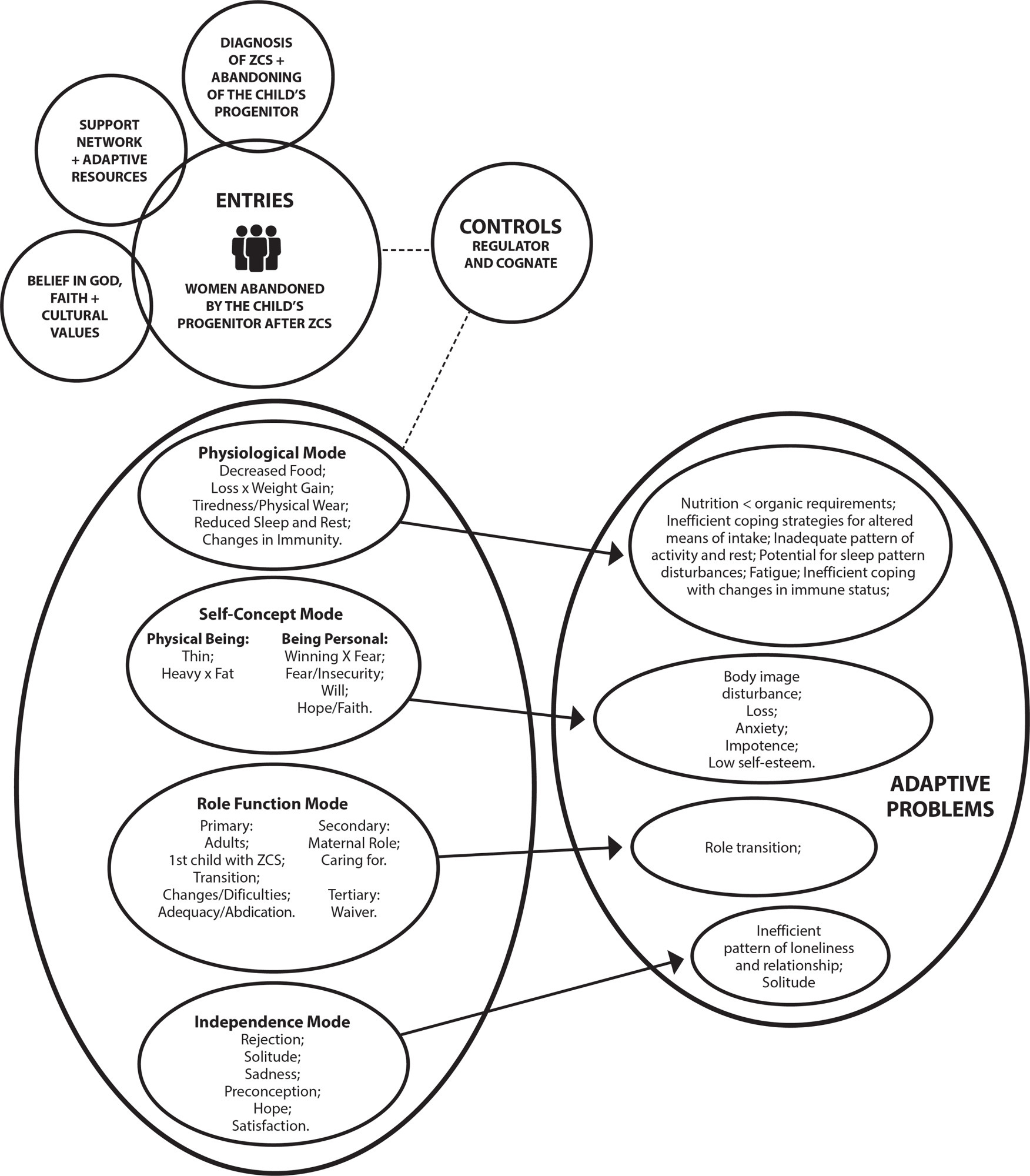
-
ORIGINAL ARTICLE05-28-2021
Nurses’ educational practices in Family Health Strategy
Revista Brasileira de Enfermagem. 2021;74(2):e20200045
Abstract
ORIGINAL ARTICLENurses’ educational practices in Family Health Strategy
Revista Brasileira de Enfermagem. 2021;74(2):e20200045
DOI 10.1590/0034-7167-2020-0045
Views0See moreABSTRACT
Objectives:
to analyze the nurse’s educational practice in Family Health Strategy.
Methods:
descriptive study with a qualitative approach, whose data production used the World Café group technique, in two meetings, with 26 nurses of a health district of Manaus-AM. The technique used was Categorial-Thematic Content Analysis.
Results:
the study generated two units of analysis: Political and Organizational Configuration of Educational Work at ESF and Operational Configuration of Educational Work at ESF, revealing the necessary (re)configurations in co-management, in the centrality of the subject for the planning of educational work, and in (re)pactuation between the management of services and training institutions to overcome contradictions in the implementation of National Policies on Permanent Education and Basic Health Care.
Conclusions:
the configuration of nurses’ educational practice at ESF works toward interactions, organized to respond to health policies, incorporating creativity in doing, but facing numerous obstacles.
-
REFLECTION11-11-2020
Children with special needs in health: challenges of the single health system in the 21st century
Revista Brasileira de Enfermagem. 2020;73:e20190037
Abstract
REFLECTIONChildren with special needs in health: challenges of the single health system in the 21st century
Revista Brasileira de Enfermagem. 2020;73:e20190037
DOI 10.1590/0034-7167-2019-0037
Views0See moreABSTRACT
Objective:
Reflect on the gaps in the care of Children with Special Needs in Health that demand complex clinical care with dependence on technological support for the maintenance of life, in the Unified Health System.
Methods:
This is a reflection study based on recent policies and literature related to the theme.
Discussion:
Despite the advances achieved with the Unified Health System with regard to access to health services and the expansion of Primary Care, with the aim of reorienting health, it can be said that the health care model for CSHCN in Brazil is still centered on the hospital and medical knowledge.
Final considerations:
There are gaps in the policies for children aimed at the new paediatric profile, and little is discussed about its implications for the Unified Health System.
-
REVIEW07-31-2020
Educational practices for families of children and adolescents using a permanent venous catheter
Revista Brasileira de Enfermagem. 2020;73:e20190129
Abstract
REVIEWEducational practices for families of children and adolescents using a permanent venous catheter
Revista Brasileira de Enfermagem. 2020;73:e20190129
DOI 10.1590/0034-7167-2019-0129
Views0See moreABSTRACT
Objectives:
to identify, in the scientific literature, the educational practices performed by nurses with the families of children and adolescents using long-term venous catheters, concerning home care.
Methods:
integrative review in LILACS, PubMed, SCOPUS, Web of Science and CINAHL databases, from August to September 2018.
Results:
we analyzed eight articles that met the inclusion criteria. The results showed that all studies are international, mostly North American and with low level of evidence. The educational practices found were home visits, production of printed educational materials, use of mannequins for simulation, creation of an educational video, and combined educational practices.
Final Considerations:
the care provided by families at home in the countries studied is more complex than in Brazil, and the conclusion is that Brazilian studies need to advance in publications related to this area.
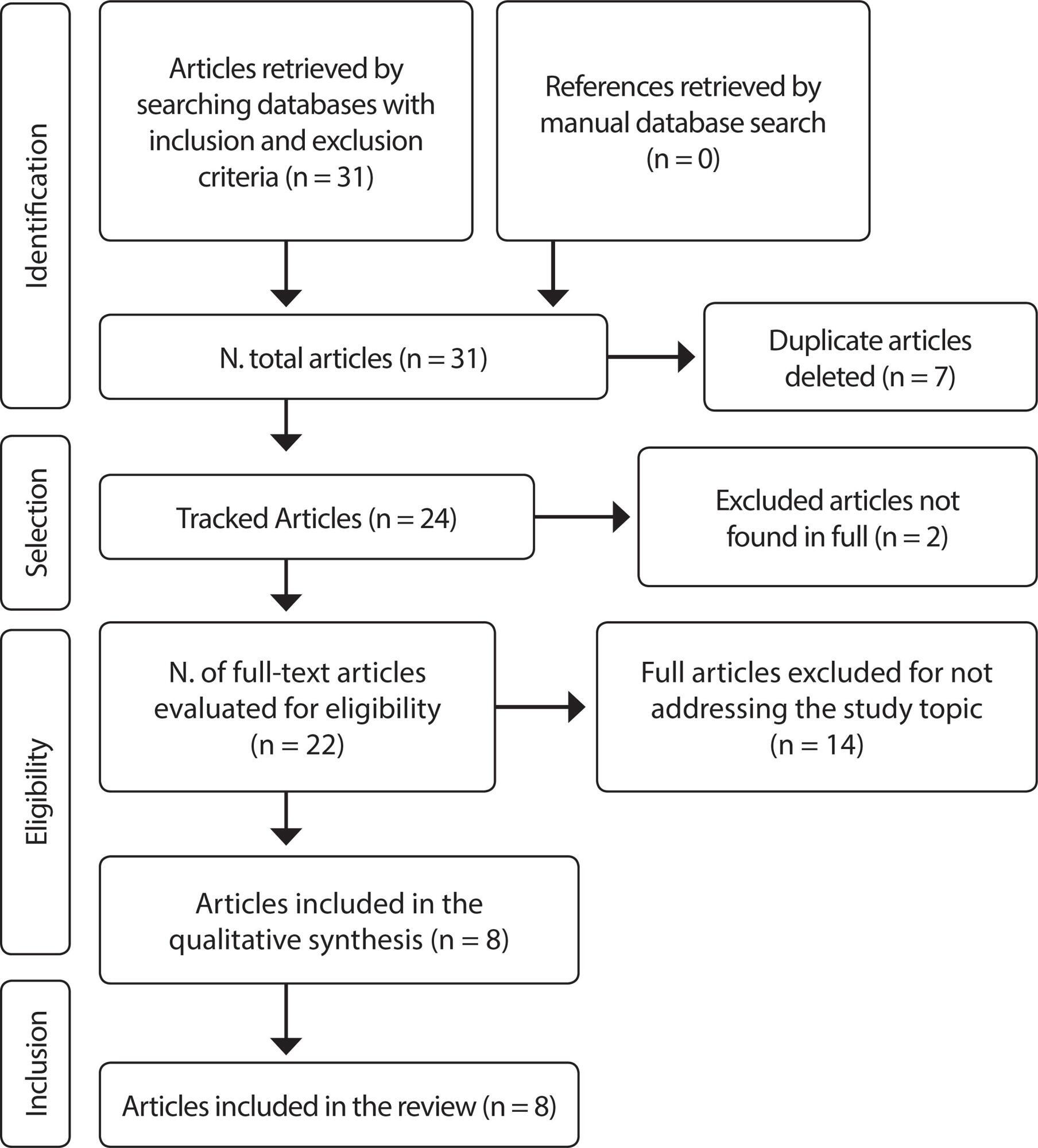
Search
Search in:
Nuvem de Tags
Adolescente (85) Atenção Primária à Saúde (239) COVID-19 (91) Criança (91) Cuidados de Enfermagem (269) Educação em Enfermagem (151) Educação em Saúde (139) Enfermagem (930) Enfermagem Pediátrica (86) Estudantes de Enfermagem (77) Estudos de Validação (131) Família (87) Idoso (208) Promoção da Saúde (99) Qualidade de Vida (104) Saúde do Trabalhador (86) Saúde Mental (145) Saúde Pública (82) Segurança do Paciente (150) Tecnologia Educacional (100)



